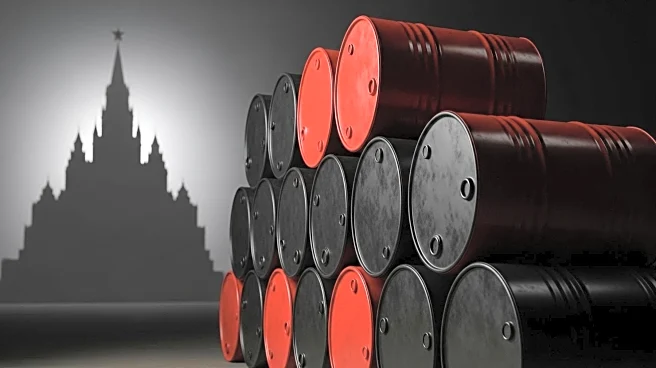What is the story about?
What's Happening?
Russia is experiencing a significant economic slowdown, exacerbated by a fuel crisis attributed to Ukrainian drone attacks that have disrupted up to 17% of the country's refining capacity. This has led to a sharp increase in fuel prices, affecting consumers and businesses alike. The Russian government, which has been heavily investing in its military efforts in Ukraine, is now facing the challenge of balancing economic growth with inflation control. The Central Bank has responded by cutting interest rates in an attempt to manage inflation, which remains high at 8.2%. Economists are divided on the severity of the situation, with some viewing it as a manageable slowdown, while others warn of potential stagnation or recession.
Why It's Important?
The economic slowdown in Russia has significant implications for its domestic stability and international relations. The high military spending, which accounts for 41% of the national budget, has distorted labor markets and contributed to inflation. This economic strain could lead to increased unemployment, potentially driving more citizens to join the military for financial stability. The situation also pressures the Russian government to maintain its wartime economy, which relies heavily on oil revenues and is vulnerable to international sanctions. A prolonged economic downturn could force Russia to reconsider its military strategies or seek negotiations, impacting global geopolitical dynamics.
What's Next?
The Russian government is expected to address the budget deficit, potentially through tax increases, which could further strain consumer finances and exacerbate inflation. The Central Bank's efforts to control inflation will continue, but the effectiveness of these measures remains uncertain. The Kremlin's ability to sustain its military expenditures without compromising economic stability will be closely watched. Internationally, any shifts in Russia's economic or military strategies could influence global markets and diplomatic relations, particularly with countries involved in the sanctions regime.
Beyond the Headlines
The economic challenges facing Russia highlight the broader ethical and strategic dilemmas of prioritizing military spending over civilian needs. The potential tax hikes and inflationary pressures could lead to public discontent, testing the government's ability to maintain social stability. Additionally, the situation underscores the interconnectedness of global economies, as disruptions in one region can have ripple effects worldwide, particularly in energy markets.















